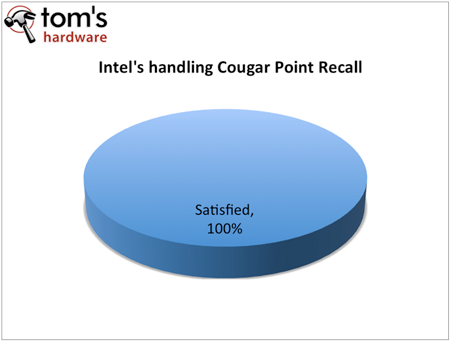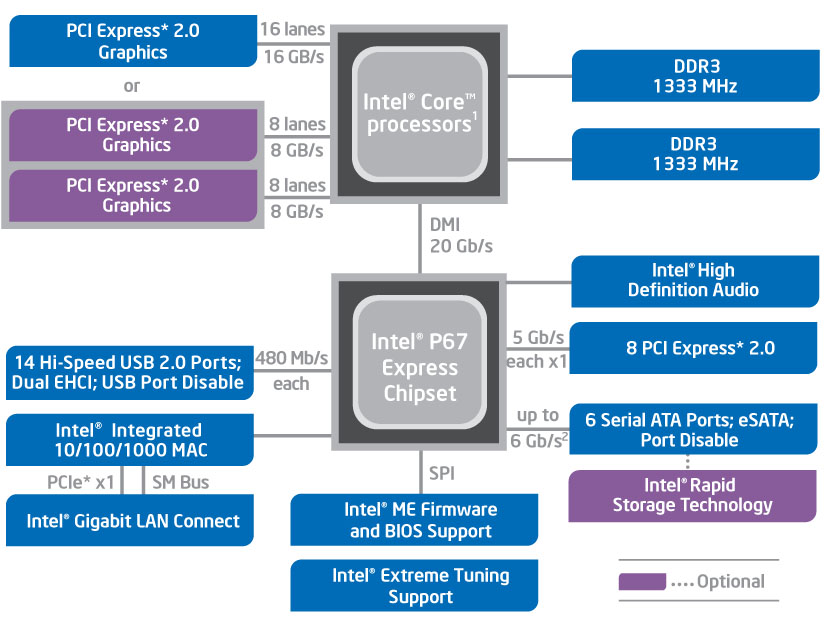Behind the Tech: Sandy Bridge Recall, An Insider's Story
Total Recall
None of the motherboard companies we contacted had a complaint about the way Intel handled its stop-shipment. As one person said, “It’s just business.” However, everyone wishes that Intel had briefed them earlier.
There are several reasons why Intel couldn’t disclose the chipset bug before Jan. 31. Recall notices are subject to federal regulations and customer protection laws. Once Intel committed to a stop-shipment, it was legally bound to make the disclosure public before its motherboard partners were informed.
Intel could have placed the problem under a warranty program for those cases when the chipset would fail. If you examine the numbers, Intel shipped 8 million chipsets by the time the problem was discovered. Even if we are pessimistic, 15% of 8 million chipsets is 1.2 million potential failures. The problem was that any chipset warranty would have been a long-term logistical nightmare. Unlike CPUs, the company doesn’t sell its chipsets directly to customers. So, warranties would have involved coordination with motherboard manufacturers. According to our sources, the fear was that, in the long run, some customers would abuse the program to get new boards at the slightest sign of a problem, even if their problem was completely unrelated to the SATA bug.
From a legal perspective, Intel does not have an explicit duty to issue an official recall. See Patton v. Hutchinson Wil-Rich Manufacturing Company (Kansas 1993), Tabieros v. Clark Equipment Co. (Hawaii 1997), and Gregory v. Cincinnati Inc. (Mich. 1995). But even though a manufacturer may not have an affirmative duty to conduct a voluntary recall, it does have the responsibility to warn its customers imposed upon it by virtue of post-sale responsibility, which includes the possibility of class-action lawsuits. Lawsuits are, by definition, uncertain outcomes. Class-action lawsuits can be very expensive. After factoring in the warranty program, the addition of a class-action lawsuit would have easily exceeded the initial $700 million price tag. Practically speaking, the recall allows Intel to avoid implementing a lengthy PR campaign to preserve brand image. It also has the additional benefit of keeping the problem out of the courts.
And you'll notice we keep calling it a stop-shipment. Intel is very sensitive about the verbiage used to describe its actions (likely a result of the legal implications). With that said, we have no problem referring to the effects of its actions by the motherboard vendors as recalls. When a piece of your car is found to be defective and you get a letter in the mail stating that a dealership will fix it free of charge to you, that's a recall. And that's exactly what motherboard vendors were offering to their customers after Intel's own action.
Get Tom's Hardware's best news and in-depth reviews, straight to your inbox.
-
acku Reply9512301 said:Lol, that neighborhood watch picture still creeps me out to this day.
Well that's why you shouldn't talk to strangers. :) -
dogman_1234 So Intel noticed the problem before hand and did nothing until it became apparent? I am not one to criticize Intel, but if any error is noticed, i would warn of it immediately.Reply -
ferelden Sandybridge performance is just too beastly for this to affect it long term, most people who have just come into the cpu market to upgrade didn't even realize there was a recall in the past and just got a b3 p67 and i5-2500k without any hesitationReply -
Stardude82 Knowing the problem, I'd totally buy a B2 board at a serious discount. Most PC's only have 2 drives anyway and SATA add-on cards are cheap.Reply -
f-14 i didn't see any problem for sales, people just bought core i-7 9XX'sReply
AMD could crow all they wanted, they didn't have a new product going to the shelf capable of beating the previous i-series. now had AMD released llano during this, they would have made a pre-emeptive death knell strike against sandybridge, but they didn't so it didn't matter what happened until AMD does. -
f-14 oh and also the problem could have been more easily rectified by intel giving out coupons for sata3 devices priced to match sata2 devices and pull it off as a promo that would have sold them millions more in profits.Reply
as for the people who already bought a 'free' sata 2 device to sata3 replacement device coupon would have been cheaper also.
Intel just blew a huge marketing opprotunity to grind AMD under the imperial capitalist yankee boot.
IMO -
joytech22 All I can say after reading this is that Intel did a great job with this issue.Reply
But it somehow still brings me back to how AMD is still spending money on a product we haven't even seen benchmarks about yet.
Somebody who uses an OEM machine somewhere around the world MUST have released a benchmark of Llano or BD at some point in time. -
rolli59 It is just business! I wonder if the speculations on the time line is true but most definitely the OEM's had discovered problems well before release.Reply -
emergancy exit or people are just brand loyal to the point of insanity. and intel is cashing in and and keeping their prices high.Reply

